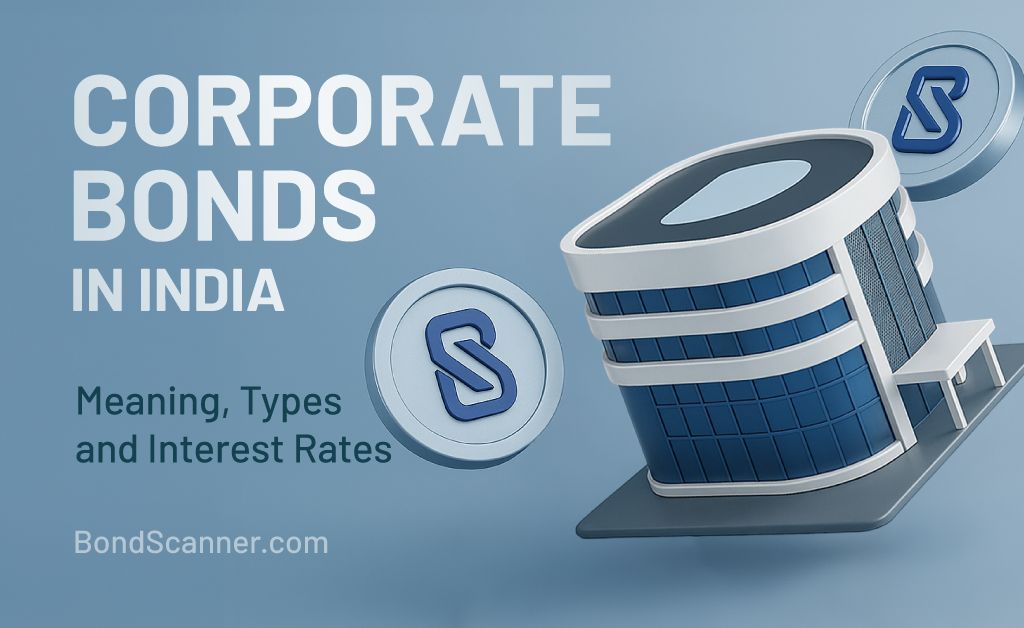Corporate Bonds in India: Meaning, Types & Interest Rates
01 October 2025

Corporate Bonds vs Government Bonds
| Feature | Corporate Bonds | Government Bonds |
|---|---|---|
| Issuer | Companies, PSUs, Financial firms | Government of India |
| Risk Level | Varies (credit rating dependent) | Very Low (sovereign-backed) |
| Interest Rate | Higher (6–9% or more) | Lower (5–7%) |
| Security | Backed by issuer’s financials/assets | Sovereign guarantee |
| Liquidity | Moderate to High | High |
FAQs on Corporate Bonds
Q1. What are corporate bonds?
Corporate bonds are debt instruments issued by companies that provide investors fixed interest income.
Q2. How to buy corporate bonds in India?
They can be purchased via online platforms, stock exchanges, banks, or brokers.
Q3. What are typical corporate bond interest rates in India?
Rates usually range from 6% to 9%, depending on rating and tenure.
Q4. Are corporate bonds safe?
AAA-rated corporate bonds are relatively safer, but all carry some credit risk compared to government securities.
Q5. What is the difference between corporate bonds and government bonds?
Corporate bonds offer higher returns with moderate risk, while government bonds are sovereign-backed and safer.
Conclusion
Corporate bonds are a vital component of India’s fixed-income market, offering predictable income and diversification benefits. While they carry risks such as credit default and interest rate fluctuations, selecting higher-rated bonds can help balance risk and return.
At BondScanner, we aim to educate investors about various financial instruments, including corporate bonds, by providing transparent insights into their features, benefits, and associated risks.
Disclaimer
This blog is intended solely for educational and informational purposes. The bonds and securities mentioned herein are illustrative examples and should not be construed as investment advice or personal recommendations. BondScanner, as a SEBI-registered Online Bond Platform Provider (OBPP), does not provide personalized investment advice through this content.
Readers are advised to independently evaluate investment options and seek professional guidance before making financial decisions. Investments in bonds and other securities are subject to market risks, including the possible loss of principal. Please read all offer documents and risk disclosures carefully before investing.
Introduction
What are Corporate Bonds?
Corporate bonds are debt instruments issued by companies to raise capital for expansion, working capital needs, or other business purposes.
When an investor buys a corporate bond, they are essentially lending money to the company. In return, the company promises to:
Pay interest (coupon rate) at fixed intervals.
Return the principal amount at maturity.
Unlike shares, which represent ownership, corporate bonds represent a creditor relationship between the investor and the company.
Corporate Bonds in India
In India, corporate bonds are issued by private companies, public sector undertakings (PSUs), and financial institutions. These instruments are regulated by the Securities and Exchange Board of India (SEBI), while issuance and trading also follow RBI guidelines.
The Indian corporate bond market has been expanding steadily, as more investors look for fixed-income products to balance risk in their portfolios. Bonds are available across tenures ranging from short-term (1–3 years) to long-term (10–15 years or more).
Key Features of Corporate Bonds
Issuer – Companies, PSUs, or financial institutions.
Coupon/Interest Rate – Can be fixed or floating, paid periodically.
Maturity – Ranges from 1 year to 15 years.
Credit Risk – Depends on the issuer’s financial strength.
Tradability – Listed corporate bonds can be traded in the secondary market.
Corporate Bonds Interest Rates in India
The interest rate (yield) on corporate bonds varies depending on the issuer’s credit rating and market conditions.
AAA-rated bonds (highest safety) – Typically offer 6–8% p.a.
AA or A-rated bonds – May provide 7–9% p.a.
Lower-rated bonds – Offer higher returns but come with higher credit risk.
Disclaimer: The information provided above is for reference purposes only and serves as illustrative examples.
Factors influencing corporate bond interest rates include:
Company’s creditworthiness.
Prevailing market interest rates.
Maturity period of the bond.
Overall demand and supply in the bond market.
Types of Corporate Bonds in India
Secured Bonds – Backed by company assets as collateral.
Unsecured Bonds – Not backed by specific assets; higher risk.
Convertible Bonds – Can be converted into equity shares later.
Non-Convertible Debentures (NCDs) – Cannot be converted; offer fixed returns.
Zero-Coupon Bonds – Issued at a discount and redeemed at face value without periodic interest.
Benefits & Risks
Benefits of Corporate Bonds
Predictable Returns – Fixed coupon payments provide stable income.
Diversification – Balances risk in a portfolio dominated by equities.
Variety of Options – Different ratings, maturities, and interest structures.
Liquidity – Many listed bonds can be traded in the secondary market.
Risks in Corporate Bonds
Credit Risk – The issuer may default on payments.
Interest Rate Risk – Rising market interest rates can lower bond prices.
Liquidity Risk – Some bonds may not have enough buyers in the market.
Recent Blogs

GPF Full Form: Understanding General Provident Fund and Its Role in Salary
A detailed guide explaining the GPF full form in salary, its benefits, working mechanism, and how it functions for employees in India.
20 Feb 2026

Difference Between Loan and Debenture: Understanding Key Financial Concepts
Explore the key differences between loans and debentures, their characteristics, benefits, and how each works in corporate finance.
20 Feb 2026

AMO Order Explained: What It Is, Charges, Timing & How to Place an AMO Order in Zerodha
Learn about AMO (After Market Orders), how they work, charges, validity, and how to place AMO orders in Zerodha, along with key differences from pre-market orders.
19 Feb 2026